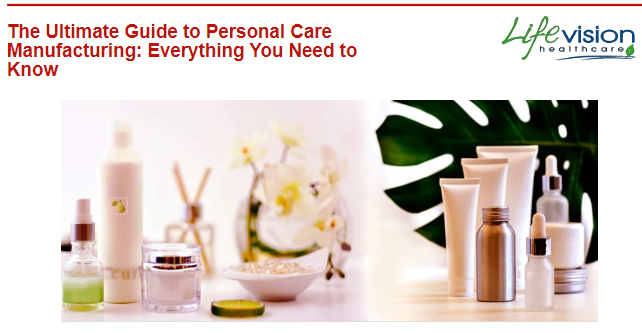

The Ultimate Guide to Personal Care Manufacturing: Everything You Need to Know - Personal care companies have been experiencing huge growth, with customers becoming more aware of their appearance and well-being. From when the whole family used the products in huge packaging to now when every member has their routine they follow, times have changed so fast. As a result, the demand for personal care products has touched the sky, making Personal Care Manufacturing a successful and ruthless industry. You can suppose you are bearing in mind entering the realism of personal care manufacturers and you want to understand the procedure behind your favorite skincare or hair care products.
Personal Care Manufacturing is a successful and ruthless industry that serves the growing demand for skincare, haircare, and grooming products. Clients have become more aware of their appearance and their health, leading to notable growth in personal care companies. If you are thinking of entering the industry of personal care making or manufacturing or want to grow a deeper grip on the process behind your favorite products, this inclusive guide will offer you everything you require to know. In this case, that thorough guide will give you the information you want to know with everything you need for your healthcare products.
Personal Care Manufacturing means providing various products for personal hygiene, grooming, and beauty. These products include skincare items like serums, lotions, creams, and hair care products like conditioners, shampoos, and grooming products. This process includes specifying raw materials, formulating products, manufacturing, and packaging.
Every skincare brand has different requirements when it comes to making that product, and if you do not understand where to start – fear not! Here we have explained everything you require to know about skincare making, from locating a factory that fits your company’s site and price range to product labeling rules and regulations. So give attention to it because this is going to be a great guide for increasing any respected skincare brand!
Personal care making is subject to several rules and regulations to ensure their client's safety and product success. These rules and regulations extend by country and may involve needs for labeling, material declaration, making practices, and product testing. Makers must stay updated and agree with the latest rules and regulations to avoid legal difficulties.
Personal care companies regularly develop, driven by clients' demands and tools and technological advancements. Makers stay ahead by including new trends and innovations in their products. This involves using unique sources of materials, and their combinations, containing different packaging solutions, and grabbing emerging technologies in the field.
While fulfilling, it also comes with its real share of challenges. Some common difficulties involve sourcing the best quality raw ingredients at affordable prices, controlling regularity in product quality, timely promises, controlling supply chain logistics, and staying competitive in a soaked market. These difficulties need judicious planning, related operations, and flexibility to change market energy.
You should choose a brand that provides facilities
Brand Values - A brand that has a respected value is the brand that is needed for you. A brand with a trustworthy name is more reliable to you.
Chemical Free - A chemical-free product is more beneficial for you in comparison with others. Products will be harsh on your skin. Those are based on chemicals.
According to your Skin - If you do not know about your skin type then there is no benefit of skincare. According to studies and research our skin mainly has 3 types dry skin, combination skin, and oily skin, If you want your skin spotless and clear you should skin care products according to your skin type
Personal Care Manufacturing is a compound process that contains several stages, from research and development to deal out. Manufacturers must cross through regulatory conformance, grab industry trends, and overcome challenges to their success in this comprehensive market. By knowing the key aspects of personal care making outlined in this guide, you can gain valuable profits in the industry and appreciate the effort that goes into making products that increase our personal care routines.
Question 1. What is the basic skincare routine?
Answer. The basic skincare routine is cleansing, moisturizing, and protecting your skin from sun damage with sunscreen.
Question 2. How many classifications does cosmetics have?
Answer. Mainly cosmetics have 3 main classifications; these are for skin cosmetics, cosmetics for hair, cosmetics for nails, and cosmetics for hygiene purposes.